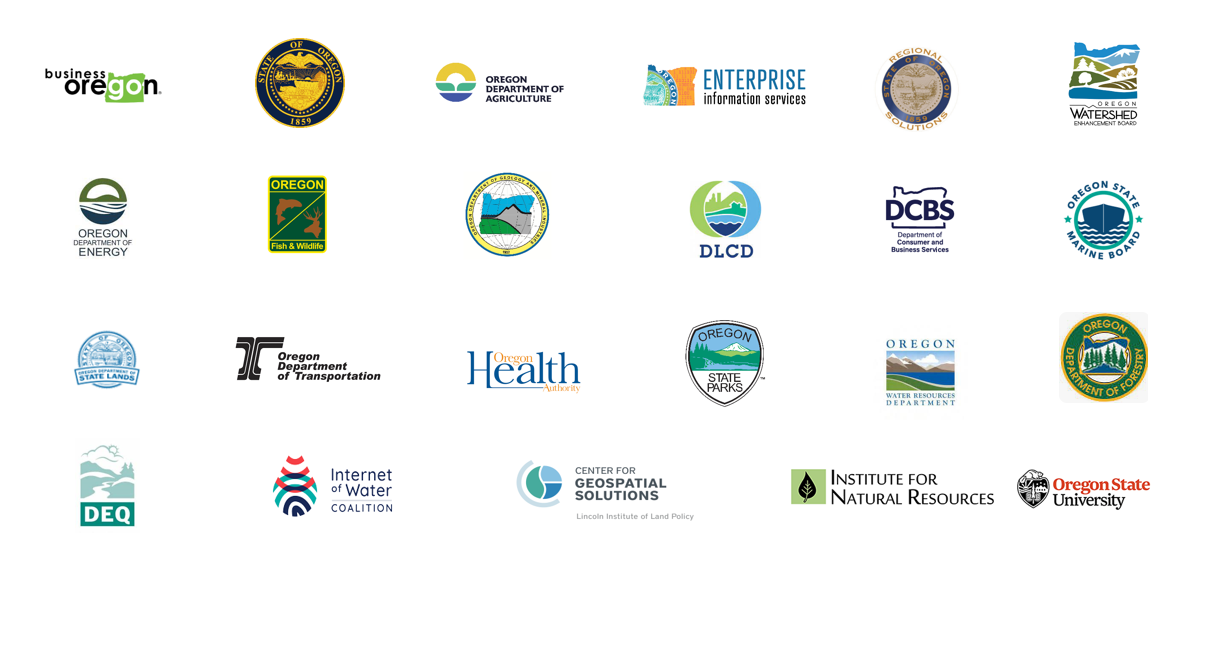The Oregon Water Data Portal is a collaborative effort
The Oregon Department of Environmental Quality and other state agencies, universities and contractors are currently planning a water data portal in response to direction from the 2021 Oregon Legislature (HB 5006), and widespread public interest in having improved data and information resources to support water-related decision making.
Visit the Pilot Oregon Water Data Portal
Initial scoping and planning efforts for the Oregon Water Data Portal were completed in June 2023. The initial stage involved staff from many state agencies who collaborated to identify existing data that could be easily made available to a portal, and document the additional work needed to improve older data, fill data gaps, and meet the needs of multiple users. In 2023, the Oregon legislature allocated funding in DEQ's budget to conduct Stage 2 of the portal development, which included identifying and evaluating existing state agencies technical tools and software resources that could be used to develop and support the OWDP and creating a pilot version of the portal.
Additionally, the
Internet of Water Coalition, an organization experienced in working with state and federal agencies in the development of water data infrastructure and open data policy, is providing lessons learned to Oregon agencies about efforts in other states to improve water data management and access to water information.
 Sign up for email or text updates about this project via GovDelivery
Sign up for email or text updates about this project via GovDeliveryBuilding on past and recent water planning efforts to support future water security
The OWDP can identify past water planning efforts and support better water futures for Oregonians. The OWDP will be responsive to recommendations from Oregon's 2017 Integrated Water Resources Strategy, the 2020 Oregon's 100-Year Water Vision, and the Oregon Secretary of State's 2023 Water Security Advisory Report by pulling together data currently stored across many different agencies, and supporting the use of those data to answer important water questions. The development, content and structure of the OWDP will be informed by the needs and concerns of potential users, and focus on equity issues identified in the
Oregon Water Futures discussions.
Providing agencies with data and information to address challenging water management decisions
Examples of the types of water management challenges that the OWDP may help agencies to address include, among others:
- Tracking the current function and safety of dams, canals, and other critical public water infrastructure.
- Supporting sharing and combining reported data between agencies.
- Bringing together existing and new groundwater data to improve understanding of aquifer-specific groundwater budgets.
- Forecasting water availability and demand under climate and population growth change scenarios.
- Developing a statewide assessment of Publicly Owned Treatment Works infrastructure improvement needs to ensure compliance with the Clean Water Act and to address future water quality and climate challenges.
- Documenting outcomes of water planning efforts, such as instream flow conservation programs.
More than 17 state agencies in Oregon make decisions or implement rules that relate to water. The Oregon Water Data Portal project is informed by a multi-agency project Steering Committee. DEQ has been assigned by the Oregon Legislature to lead support of the OWDP project.
Work completed for the 2021-2023 biennium included: scoping and design by meeting with tribes and interested parties; inventorying currently existing water data sets held by the 17 state agencies with water related missions or functions; assessing dataset readiness for inclusion in the OWDP; identifying additional critical data needs; and evaluating the technical aspects of the portal platform that would be needed.
Work completed for the 2023-2025 biennium included: meetings with tribes and interested parties; a plan for ongoing governance; standard operating procedures; and a pilot portal demonstrating complete data workflow to meet the needs of several use cases.
Public agency partners and contracted organizations

Oregon Water Data Portal Project Collaboration